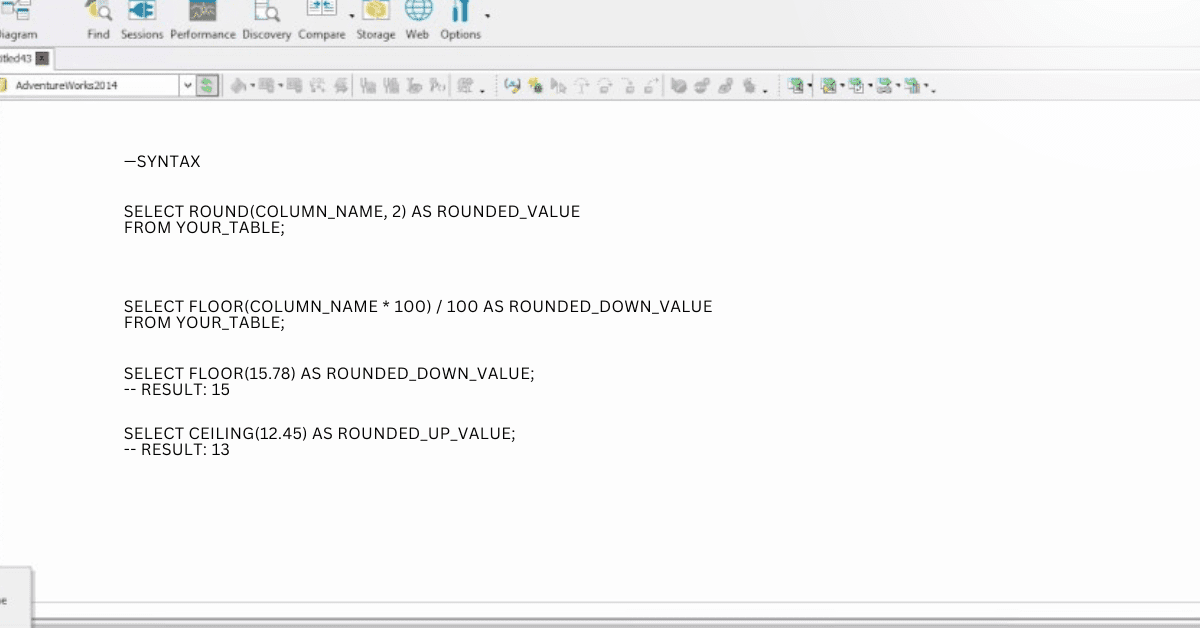Function roundup in SQL is used to round numeric values to a specified number of decimal places.
if the length parameter is -1. ROUND(55.65, -1) yields 60. If your operation is without decimal place, and accuracy parameter is left empty or set to 0, the length argument supplied by numeric_expression will be rounded to the closest integer.
SELECT ROUND(55.65, -1) AS rounded_value
FROM table_name;
Result:
60
SELECT ROUND(55.65, 0) AS rounded_value
FROM table_name;
Result:
56
Moreover, Round() function in SQL used to round the value to the a specified number to a specified decimal places. For Example,
SELECT ROUND(column_name, 2) AS rounded_value
FROM table_name;
This query rounds the values in “column_name” to 2 decimal places. You can adjust the second parameter of ROUND to specify the number of decimal places you want. For instance, if you want to round the value to 3 decimals, add 3 at the second parameter of ROUND function (and so on). For example:
SELECT ROUND(column_name, 3) AS rounded_value
FROM table_name;

Round Up Or Round Down Number In SQL Server At Given Decimal Places
In SQL Server, you can use the ROUND function to round a number to a specified number of decimal places. To round up or round down at a given decimal place, you can use the combination of ROUND, CEILING, or FLOOR functions. Here are examples:
Round Up To A Specific Decimal Place:
SELECT ROUND(column_name, 2) AS rounded_up_value
FROM your_table;
This query rounds the values in “column_name” to 2 decimal places. You can adjust the second parameter of ROUND for the desired decimal places.
Round Down To A Specific Decimal Place:
SELECT FLOOR(column_name * POWER(10, 2)) / POWER(10, 2) AS rounded_down_value
FROM your_table;
This example multiplies the values by 100, rounds down to the nearest integer, and then divides by 100 to get the result with two decimal places. Adjust the multiplier and divisor based on your desired decimal places.
What Is Roundup In SQL
In SQL, there isn’t a specific “ROUND UP” function. Instead, you can achieve rounding up by using the CEILING function. The CEILING function returns the smallest integer greater than or equal to a given numeric expression. It rounds up given number to the closest integer. This function consists of two arguments the number needs to be rounded up and the decimal places the number needs to be rounded it to. For example;
SELECT CEILING(column_name) AS rounded_up_value
FROM table_name;
This query would round up the values in “column_name” to the nearest integer. If you want to round up to a specific number of decimal places, you can combine CEILING with a power of 10. For example, to round up to two decimal places:
SELECT CEILING(column_name * 100) / 100 AS rounded_up_value
FROM table_name;
This multiplies the values by 100, rounds up to the nearest integer, and then divides by 100 to get the result with two decimal places. Adjust the multiplier and divisor based on the desired decimal places.
Examples Of Round Up A Number To The Nearest Integer In SQL
Certainly! Here are some examples of rounding up a number to the nearest integer using the CEILING function in SQL:
Basic rounding up:
SELECT CEILING(12.45) AS rounded_up_integer;
— Result: 13
Rounding up a column in a table:
SELECT CEILING(column_name) AS rounded_up_integer
FROM table_name;
Replace “column_name” with the actual column name containing the numbers you want to round up.
Rounding up after performing a calculation:
SELECT CEILING(total_amount / 5) AS rounded_up_integer
FROM orders;
This example rounds up the result of dividing the “total_amount” column by 5.
Examples Of Round Down In SQL
To round down a number in SQL, you can use the FLOOR function. The closest integer that is less than or equal to the input number is returned by this function, which truncates a number’s decimal points. For examples:
Basic rounding down:
SELECT FLOOR(15.78) AS rounded_down_integer;
— Result: 15
Rounding down a column in a table:
SELECT FLOOR(column_name) AS rounded_down_integer
FROM your_table;
Replace “column_name” with the actual column name containing the numbers you want to round down.
Rounding down after performing a calculation:
SELECT FLOOR(total_amount / 5) AS rounded_down_integer
FROM orders;
This example rounds down the result of dividing the “total_amount” column by 5.
Feel free to contact me and write, how may I help you? further in this topic or any other related topic? Gudluck!
Roundup In SQL is not free from errors.
How To Avoid Potential Errors
When using the ROUND function in SQL, it’s essential to be aware of potential pitfalls to ensure accurate and expected results. Here are some things to avoid or be cautious about:
- Floating-point numbers might introduce rounding errors. If precision is critical, consider using appropriate numeric data types like DECIMAL.
- Ensure that the data types of the values you are rounding are compatible with the ROUND function. If there are implicit data type conversions, it might lead to unexpected results.
- Be aware of whether you want to round up, round down, or round to the nearest integer. Use CEILING or FLOOR for explicit rounding up or down.
- If your column might contain NULL values, consider using the COALESCE or ISNULL function to provide a default value before applying the ROUND function.
- Double-check that you are rounding to the correct number of decimal places. Incorrect precision may lead to unexpected results.
